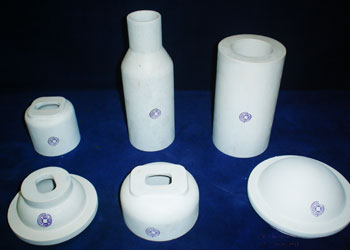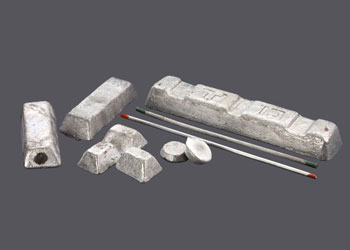General Description
CERALOY TiCB-3:0.25:0.25 (9.5 MM DIA. COIL) is a grain refiner used in the production of AAA Conductor wires and Aluminium Silicon alloys having Zirconium and Vanadium. Controlled addition of Ceraloy Titanium Carbon Boron to molten aluminium releases nucleant particles that promote equiaxed, fine grain structure throughout the cast alloy, thus avoiding formation of columnar crystals. Casting speed can also be increased.
Purpose
Aluminum and its alloys typically solidify in a heterogeneous manner, resulting in a coarse dendritic structure. This coarse grain structure can lead to several issues, including poor mechanical properties, inadequate feeding characteristics, and a reduced response to surface and heat treatments.
AAA Conductor Wires: Zirconium is added to inhibit recrystallization at elevated temperatures.
Aluminum Silicon Hyper-eutectic Alloys: Zirconium and Vanadium are added to enhance creep resistance, thermal stability, and strength at elevated temperature.
When using the traditional AlTiB 5:1 master alloy, the formation of TiB2, TiAl3, AlB2, and AlB12 alloy phases occurs. The AlB2 and AlB12 phases react with Zirconium and Vanadium to form borides. Since these borides are heavier, they settle in the molten metal bath, causing a deficiency of Zirconium and Vanadium in the alloy cast product, which prevents the desired properties from being achieved.
To prevent the formation of AlB2 and AlB12 alloy phases, the boron content in the alloy is intentionally maintained at a lower level. The available boron reacts with Titanium, resulting in the formation of TiB2 and TiAl3 phases. To address the boron deficiency in the grain refiner, carbon is added, which then forms TiC phase particles. These particles also contribute to the grain refining of aluminum.
To minimize boride formation and maintain grain refining efficiency, we recommend using CERALOY TiCB-3:0.25:0.25. This will help achieve the desired alloy chemistry and ensure optimal electrical and mechanical properties.
Advantages
- Enhanced Solubility: It readily dissolves in aluminum alloys due to its metallic nature, offering more consistent results compared to salt-based grain refiners.
- Superior Fade Resistance: It maintains its refinement effect for a longer duration.
- Poisoning Resistance: It is resistant to Zirconium & Vanadium poisoning in high-strength alloys.
- Reduced Agglomeration and Segregation: It has very low particle agglomeration and segregation.
- Improved Mechanical and Metallurgical Properties: It enhances as-cast mechanical properties, such as the tensile strength and hardness of castings.
- Better Machinability: The refined metallurgical structure of the Alpha Phase results in improved machinability.
- Environmentally Friendly: It is more environmentally friendly than conventional salt-based refiners.
Instructions for Use
Prepare the desired alloy composition. Follow the normal molten metal cleaning process, add CERALOY TiCB-3:0.25:0.25 through continuous rod feeder machine into molten metal flow as per desired addition rate.
Application Rate
0.1–0.2%
Application Temperature: 680 – 720°C
Specifications
Mean Particle Size of TiAl3: Below 50 Micron
Mean Particle Size of TiC: < 1 Micron
Mean Particle Size of TiB2: < 2 Micron
Shape: 9.7 ± 0.3 mm Dia. Rod Coil
Weight: 200 ± 20 Kg (Standard size)
Label: Continuous Product Label on coil after interval of 1 meter
Packaging Cover: 3 coils, strapped tightly with Steel/PET strips to hold and wrapped with waterproof cover and placed on pallet. Package properly labelled with Product Name, Batch/Heat No., Manufacturing date and supplier name.
Storage: Store in cool & dry place, away from direct heat.
Note: Addition level can vary depending on the casting process, alloy composition, section thickness and solidification rate of the casting.
Material Safety Data Sheet (MSDS) is Available on Request
Our Products
We offer a wide range of foundry products and services to meet the requirements of iron, steel and non-ferrous
foundries to help them to reduce defects, improve casting quality and optimise production costs.








